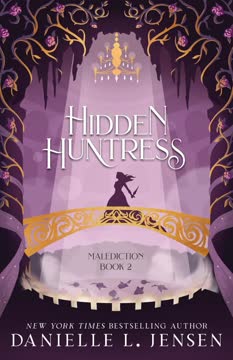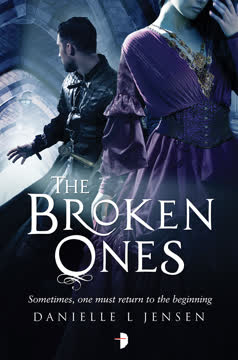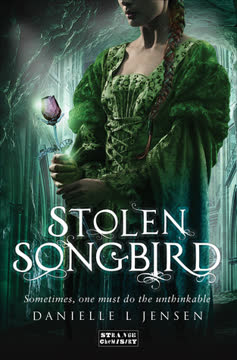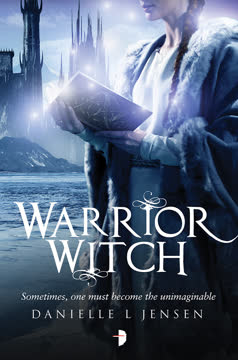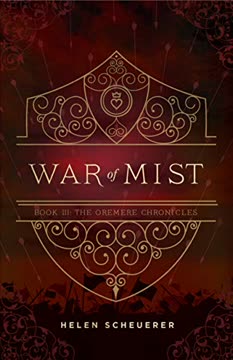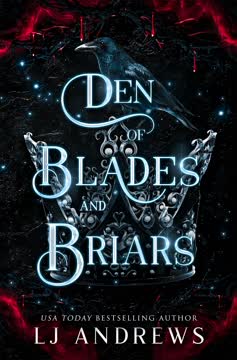Plot Summary
Shadows Over Trianon
Cécile, now a celebrated singer in Trianon, is tormented by the pain of her bond with Tristan, the troll prince imprisoned beneath the mountain. Her days are spent performing and searching for Anushka, the witch whose curse keeps the trolls trapped. Despite the glittering world of the opera and her mother's ambitions, Cécile is isolated, her relationships strained by secrets and the weight of her mission. The city's surface glamour hides a web of lies, betrayals, and the ever-present threat of magic. Cécile's longing for Tristan and her guilt over his suffering drive her, but the search for Anushka proves fruitless, and the cost of her obsession grows. The chapter sets the stage for a tale of divided loyalties, love under siege, and the darkness lurking beneath beauty.
The King's Bargain
Summoned to the mouth of the River Road, Cécile faces King Thibault, who offers her Anushka's grimoire in exchange for a binding promise: she must do whatever it takes to find and deliver the witch. The king parades a tortured Tristan before her, forcing Cécile to witness his suffering. Unable to bear it, she agrees, sealing her fate and deepening the compulsion that will drive her actions. The king's manipulations are chilling, and Cécile's sacrifice is both an act of love and a step into darkness. The cost of her promise is immediate and devastating, and the chapter cements the central conflict: the price of freedom, and the power of a word.
Chains and Choices
Imprisoned and broken, Tristan is released from his cell, his body and spirit battered by his father's punishments. He is haunted by guilt for forcing Cécile into her promise and for the suffering of his friends. The city is changed—his father's political machinations have shifted the balance of power, and the half-bloods are building a doomed structure. Tristan's allies are scattered or punished, and betrayal lurks everywhere. Yet, even in despair, he begins to unravel his father's schemes, discovering that nothing is as it seems. The chapter explores the limits of endurance, the complexity of love, and the seeds of rebellion.
The Mask of Anaïs
As Cécile's search for Anushka intensifies, Tristan uncovers a chilling truth: Anaïs, his childhood friend, is dead, and her place has been taken by Lessa, his half-sister, using magic and lies. The revelation shatters alliances and exposes the depth of Angoulême's and Thibault's manipulations. The half-bloods' ability to lie, long hidden, becomes a weapon in the political game. Grief and anger threaten to consume Tristan and his friends, but the need for vengeance and justice steels their resolve. The chapter is a turning point, where masks fall and the true enemy begins to emerge.
Bloodlines and Betrayals
Cécile's relationship with her mother, Genevieve, is fraught with tension and unspoken pain. A night of confession reveals the wounds of abandonment and the complexity of love. Meanwhile, Cécile's investigation into Anushka's immortality uncovers a pattern: the witch is killing her own descendants to maintain her youth. The realization that Cécile and her mother are next in line is both terrifying and galvanizing. The chapter weaves together themes of legacy, sacrifice, and the inescapable pull of blood, setting the stage for a confrontation that is as personal as it is epic.
The Witch's Web
Cécile's hunt leads her to La Voisin, a witch in Pigalle, whose knowledge of blood magic and curses is both a resource and a warning. The city's underbelly is a place of danger, and Cécile's alliances are tested as friends betray and enemies close in. The compulsion of her promise grows, driving her to desperate acts and dark magic. The lines between right and wrong blur as Cécile sacrifices more of herself in the pursuit of her goal. The web tightens, and the cost of every choice becomes more acute.
The Price of Freedom
Tristan, with the help of Marc, the twins, and the half-bloods, orchestrates a coup against his father's plans. The city is on the brink of civil war, with the half-bloods and guilds rallying to Tristan's cause. Yet, every victory is shadowed by loss—Anaïs, Élise, and others pay the price for defiance. The promise Cécile made is a ticking clock, and both she and Tristan are driven to the edge by the compulsion and the weight of leadership. The chapter is a crucible, forging new alliances and setting the stage for the final confrontation.
The Gathering Storm
As the winter solstice and full moon converge, the city is gripped by tension. Anushka's pattern of murder is revealed, and the realization dawns that Genevieve is the next target. Cécile and Tristan's plans to protect her and catch the witch are complicated by betrayal, political intrigue, and the ever-present threat of violence. The masquerade at the castle becomes a trap for all involved, and the lines between friend and foe blur. The storm is coming, and no one will escape unscathed.
The Solstice Trap
The Longest Night ball is a glittering snare. Cécile, forced to perform, is separated from her allies and powerless against the rowan-warded guards. Tristan, disguised and desperate, navigates a web of lies and shifting allegiances. As the masque unfolds, Genevieve is abducted, and the truth is revealed: she is Anushka. The trap closes, and the final act of the curse begins. The chapter is a masterclass in suspense, as every secret comes to light and every character is forced to choose a side.
The Mother's Secret
In a devastating confrontation, Cécile learns that her mother is Anushka, the witch who has orchestrated centuries of suffering. Through a torrent of memories, the truth of the curse, the fall of the mountain, and the cycle of vengeance is revealed. Anushka's motives are laid bare—her grief, her rage, and her twisted love. Cécile is forced to choose between mercy and justice, between love and duty. The chapter is the emotional heart of the novel, where the personal and the epic collide.
The Curse Unbound
The ritual begins, and Cécile is killed—her soul held in place only by the bond with Tristan. In a moment of clarity and power, she breaks free, and together they defeat Anushka. The curse is broken, but at a terrible cost. The trolls are free, but so are the ancient fey, and the world is forever changed. The chapter is a crescendo of action and emotion, where every sacrifice is counted and every victory is bittersweet.
The Dragon's Awakening
With the curse broken, a dragon—one of the immortal fey—descends upon Trianon, bringing death and terror. Tristan faces the creature in a battle of magic and will, barely managing to defeat it. But the horns of war sound in the distance, heralding the arrival of more fey and the beginning of a new era of conflict. The fragile peace is shattered, and the true cost of freedom is revealed.
The Cost of Mercy
In the wake of Anushka's death and the breaking of the curse, Cécile and Tristan are left to reckon with the consequences. Friends are dead, the city is in chaos, and the threat of the fey looms. The question of mercy—who deserves it, and at what cost—haunts them both. The chapter is a meditation on forgiveness, guilt, and the burden of leadership, as the survivors prepare for the battles to come.
The World Burns
As the trolls and humans face the reality of their new world, alliances are forged and broken. Tristan offers himself as a leader for peace, but the forces arrayed against him are vast and merciless. The fey are coming, and the world stands on the brink of destruction or transformation. The story ends on a note of hope and dread, as Cécile and Tristan, battered but unbroken, stand together to face the dawn of a new age.
Characters
Cécile de Troyes
Cécile is a gifted singer whose life is split between the glittering world of Trianon and the darkness of Trollus. Her bond with Tristan is both a source of strength and agony, driving her to desperate acts in the hope of breaking the curse. Cécile is fiercely loyal, stubborn, and compassionate, but her choices are shaped by guilt, compulsion, and the weight of prophecy. Her journey is one of self-discovery, as she learns the true cost of sacrifice and the complexity of mercy. Her relationship with her mother, Genevieve, is central—full of longing, resentment, and ultimately, devastating betrayal. Cécile's arc is that of a woman forced to choose between love and the greater good, and her growth is marked by pain, courage, and the willingness to do the unthinkable.
Tristan de Montigny
Tristan is the heir to the troll throne, a man of formidable intelligence, power, and compassion. His love for Cécile is his greatest strength and his deepest vulnerability, and he is tormented by guilt for the suffering of his friends and the consequences of his choices. Tristan is a master strategist, but his plans are constantly undermined by betrayal, loss, and the machinations of his father and enemies. His journey is one of endurance, as he is broken and remade by pain, love, and the demands of leadership. Tristan's struggle with his own nature—his capacity for mercy and violence—is at the heart of the novel, and his relationship with Cécile is both a salvation and a crucible.
Genevieve de Troyes / Anushka
Genevieve is a complex figure—at once a glamorous opera star, a manipulative mother, and the immortal witch Anushka. Her love for Cécile is real but twisted by centuries of grief, rage, and the need for vengeance. As Anushka, she is both victim and villain, her actions driven by the trauma of loss and the desire for retribution against the trolls. Her immortality is maintained by the murder of her descendants, and her ultimate plan is to possess Cécile's body and destroy the trolls forever. Genevieve's arc is a tragedy, as her quest for justice becomes a cycle of violence, and her final confrontation with Cécile is both heartbreaking and inevitable.
King Thibault
Thibault is the king of the trolls, a man whose cruelty is matched only by his cunning. He is willing to sacrifice anything and anyone to achieve his goals, including his own son. Thibault's inability to love or trust is both his strength and his downfall, and his relationship with Tristan is a study in power, disappointment, and the limits of control. He is a symbol of the old order—unyielding, brutal, and ultimately doomed.
Marc
Marc is Tristan's cousin and closest ally, a man marked by loss and the scars of magic. His love for Pénélope and his loyalty to Tristan are the anchors of his identity, but he is pushed to the brink of madness by the consequences of Tristan's choices. Marc's journey is one of forgiveness and endurance, as he finds new purpose in the fight for Trollus's future.
Sabine
Sabine is Cécile's childhood friend, a seamstress with a sharp tongue and a loyal heart. She is skeptical of the trolls and resentful of the changes in Cécile, but her love for her friend drives her to risk everything. Sabine's arc is one of acceptance and courage, as she moves from fear to action, and her survival is a testament to the power of friendship.
Lessa
Lessa, Tristan's half-sister, assumes the identity of Anaïs to further her own ambitions. Her ability to lie and use magic makes her a dangerous player in the political game, but her actions are driven by a desperate need for power and acceptance. Lessa's arc is a cautionary tale of self-loathing and the destructive nature of envy.
Angoulême
Angoulême is the architect of much of the suffering in Trollus, manipulating events to his own advantage and using his daughter, Lessa, as a pawn. His hatred of the half-bloods and his willingness to sacrifice anyone for power make him a formidable enemy. Angoulême's arc is one of relentless ambition, and his actions set in motion the final catastrophe.
Lord Aiden du Chastelier
Aiden is the Regent's son, caught between his oaths to the trolls and his own ambitions. His willingness to betray, manipulate, and use Cécile for his own ends makes him a dangerous foe. Aiden's arc is one of moral decay, as his hatred of the trolls blinds him to the cost of his actions.
Pierre
Pierre is the scholar and friend who helps Cécile and Tristan unravel the mysteries of the curse. His death is a turning point, symbolizing the cost of resistance and the fragility of hope. Pierre's arc is brief but impactful, and his loss is deeply felt by all.
Plot Devices
Binding Promises and Compulsion
The narrative is driven by the power of promises—binding oaths that cannot be broken without dire consequences. Cécile's promise to the king becomes a compulsion, driving her actions and shaping the plot. The device is used to explore themes of agency, sacrifice, and the cost of love. The inability of trolls to lie, and the half-bloods' secret ability to do so, is a source of both tension and strategy, allowing for deception, betrayal, and the subversion of power. The compulsion of magic is both a literal and metaphorical force, representing the ways in which love, duty, and trauma can bind and drive individuals.
Dual Narrative Structure
The story alternates between Cécile and Tristan, allowing for a deep exploration of both perspectives. This structure creates dramatic irony, as the reader is often aware of dangers and secrets before the characters are. It also allows for a rich emotional arc, as both protagonists are forced to confront their own limitations, desires, and the consequences of their choices. The dual narrative heightens suspense and deepens the emotional impact of the story's climaxes.
Foreshadowing and Prophecy
The narrative is laced with prophecy and foretelling, creating a sense of inevitability and tension. The fey's predictions, the pattern of Anushka's murders, and the convergence of the solstice and full moon all serve as harbingers of catastrophe. Foreshadowing is used to build suspense, hinting at betrayals, revelations, and the ultimate cost of freedom. The device also raises questions about fate versus free will, as characters struggle to break or fulfill the destinies laid before them.
Memory and Magic
The use of memory—both magical and emotional—is central to the plot. Spells that reveal or steal memories are used to uncover secrets, manipulate others, and drive the action. The characters are haunted by the past, and the revelation of Anushka's memories is a pivotal moment, reframing the entire conflict. Memory is both a source of pain and a tool for understanding, and its manipulation is a key plot device.
Masks and Identity
The motif of masks—literal and figurative—runs throughout the novel. Characters assume false identities, hide their true selves, and perform roles for the benefit of others. The opera and the masque are both settings and metaphors for the ways in which individuals conceal and reveal themselves. The unmasking of Anushka is the climax of this device, as the truth is finally laid bare.
Analysis
Hidden Huntress is a masterful exploration of the costs of love, freedom, and vengeance, set against a backdrop of political intrigue, magical compulsion, and generational trauma. At its heart, the novel interrogates the nature of agency—how much of our lives are shaped by our choices, and how much by the promises, blood, and histories that bind us. The dual narrative structure allows for a nuanced portrayal of both Cécile and Tristan, whose love is both a source of salvation and a crucible of suffering. The revelation that the true enemy is not a distant, monstrous witch, but the woman Cécile has loved and longed for, is a devastating twist that reframes the entire story as a tragedy of inheritance and the cyclical nature of violence. The breaking of the curse is not a triumph, but an opening of Pandora's box, unleashing new horrors even as old chains are shattered. The novel's lessons are hard-won: that mercy is as dangerous as vengeance, that the world is changed not by easy choices but by the willingness to bear impossible burdens, and that the end of one story is always the beginning of another. Hidden Huntress is a tale for a modern age—one that refuses easy answers, and dares to ask what we are willing to sacrifice for the hope of a better world.
Last updated:
Review Summary
Hidden Huntress received mixed reviews from readers. Many enjoyed returning to the world and characters, but felt it didn't live up to the first book. Common criticisms were predictable plot twists, slow pacing, and less romantic chemistry between the main characters. Some found Cécile's character development disappointing. However, readers generally appreciated Tristan's chapters and the book's ending. Despite its flaws, most reviewers remained invested in the story and looked forward to the final installment. The book's average rating was 3.83 out of 5 stars on Goodreads.
